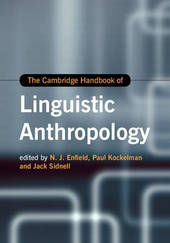
|
The Cambridge Handbook of Linguistic Anthropology
Hardback
Main Details
| Title |
The Cambridge Handbook of Linguistic Anthropology
|
| Authors and Contributors |
Edited by N. J. Enfield
|
|
Edited by Paul Kockelman
|
|
Edited by Jack Sidnell
|
| Series | Cambridge Handbooks in Language and Linguistics |
|---|
| Physical Properties |
| Format:Hardback | | Pages:763 | | Dimensions(mm): Height 254,Width 181 |
|
| Category/Genre | linguistics |
|---|
| ISBN/Barcode |
9781107030077
|
| Classifications | Dewey:306.44 |
|---|
| Audience | | Professional & Vocational | |
|---|
| Illustrations |
12 Tables, black and white; 15 Halftones, black and white; 30 Line drawings, black and white
|
|
Publishing Details |
| Publisher |
Cambridge University Press
|
| Imprint |
Cambridge University Press
|
| Publication Date |
11 September 2014 |
| Publication Country |
United Kingdom
|
Description
The field of linguistic anthropology looks at human uniqueness and diversity through the lens of language, our species' special combination of art and instinct. Human language both shapes, and is shaped by, our minds, societies, and cultural worlds. This state-of-the-field survey covers a wide range of topics, approaches and theories, such as the nature and function of language systems, the relationship between language and social interaction, and the place of language in the social life of communities. Promoting a broad vision of the subject, spanning a range of disciplines from linguistics to biology, from psychology to sociology and philosophy, this authoritative handbook is an essential reference guide for students and researchers working on language and culture across the social sciences.
Author Biography
N. J. Enfield is a Senior Staff Scientist at the Max Planck Institute for Psycholinguistics and Professor at Radboud University Nijmegen and the University of Sydney. Paul Kockelman is a Professor in the Department of Anthropology at the University of Texas, Austin. Jack Sidnell is Associate Professor in the Department of Anthropology and Department of Linguistics at the University of Toronto.
Reviews'Masquerading under the humble rubric of a 'Handbook', this stunning collection of original essays juxtaposes many of the central senior figures of linguistic anthropology with an impressive array of younger voices - including the editors themselves - shaking the mix further by sometimes unexpected but always provocative conjunctions of themes and expertise. It presents fresh evidence for why theoretical advances stemming from a preoccupation with language now inform the best of current anthropological thinking more widely. The collection not only spans an impressive range of linguistic and transdisciplinary topics, but also reflects the main centers of research and discovery in modern linguistic anthropology.' John B. Haviland, University of California, San Diego 'This extraordinarily stimulating book is a thoughtfully composed collection of fresh perspectives on five major themes in the anthropology of language.' Anthony C. Woodbury, University of Texas, Austin 'Continuing the excellent Cambridge Handbooks in Language and Linguistics series ... the editors have assembled a superb line-up of contributors who represent the diversity of perspectives within linguistic anthropology ... the limited scope of each chapter helps to narrow focus and provide depth. Used in conjunction with a textbook or additional readings, specific chapters could be profitably used in upper-level undergraduate courses. Graduate students and professionals will appreciate the index and comprehensive bibliographies provided with each chapter ... Summing up: highly recommended. All academic levels/libraries.' E. Pappas, Choice 'The Cambridge Handbook of Linguistic Anthropology is an intellectually stimulating and wide-ranging compilation that is sure to spark discussion on its vision of the field. In many ways, it offers a rebuke of what the editors see as the weaknesses of linguistic anthropology, as the introduction notes that the contributors to the volume include 'scholars who take their linguistics as seriously as their anthropology', who use methods 'far beyond ethnography and descriptive linguistics', and who 'study processes far beyond the historical and the cultural.' Adrienne Lo, Journal of Sociolinguistics
|